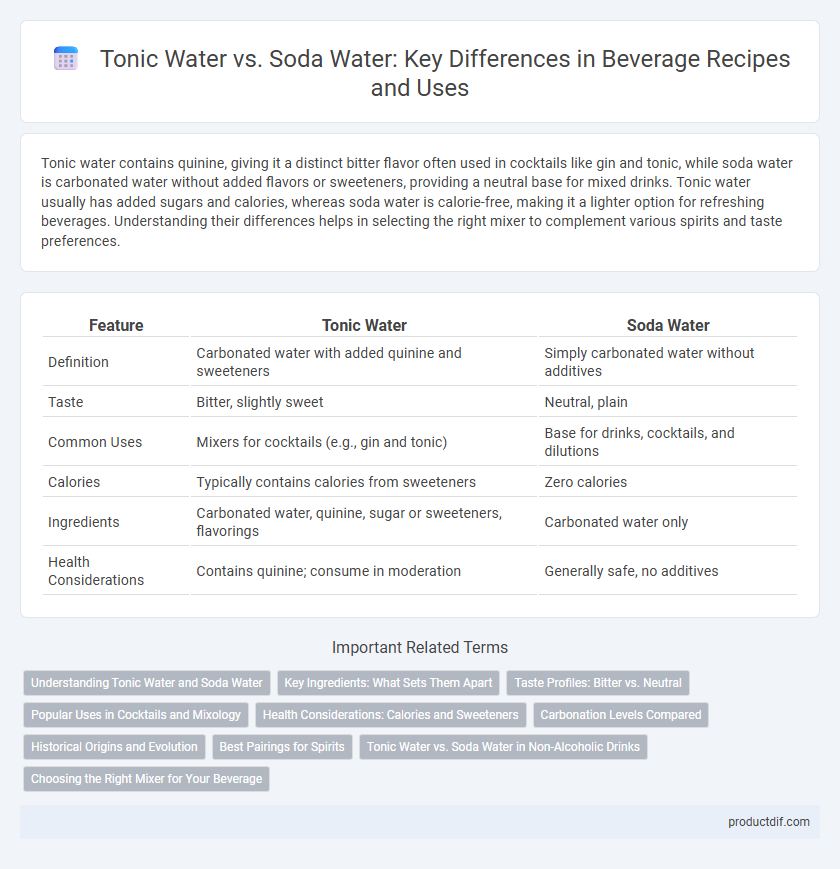Tonic water contains quinine, giving it a distinct bitter flavor often used in cocktails like gin and tonic, while soda water is carbonated water without added flavors or sweeteners, providing a neutral base for mixed drinks. Tonic water usually has added sugars and calories, whereas soda water is calorie-free, making it a lighter option for refreshing beverages. Understanding their differences helps in selecting the right mixer to complement various spirits and taste preferences.
Table of Comparison
| Feature | Tonic Water | Soda Water |
|---|---|---|
| Definition | Carbonated water with added quinine and sweeteners | Simply carbonated water without additives |
| Taste | Bitter, slightly sweet | Neutral, plain |
| Common Uses | Mixers for cocktails (e.g., gin and tonic) | Base for drinks, cocktails, and dilutions |
| Calories | Typically contains calories from sweeteners | Zero calories |
| Ingredients | Carbonated water, quinine, sugar or sweeteners, flavorings | Carbonated water only |
| Health Considerations | Contains quinine; consume in moderation | Generally safe, no additives |
Understanding Tonic Water and Soda Water
Tonic water contains quinine, which gives it a slightly bitter taste and is often used in cocktails like gin and tonic. Soda water, also known as sparkling water or club soda, is carbonated water with added minerals such as sodium bicarbonate, providing a neutral flavor ideal for mixing or drinking plain. Both beverages serve different purposes in mixology and refreshment due to their distinct mineral compositions and flavor profiles.
Key Ingredients: What Sets Them Apart
Tonic water contains quinine, a bitter compound derived from the cinchona tree bark, which gives it a distinct sharp flavor not found in soda water. Soda water is simply carbonated water infused with minerals such as sodium bicarbonate, sodium chloride, and potassium sulfate, providing a neutral and effervescent profile. The presence of sweeteners and flavorings in tonic water differentiates its taste and purpose in cocktails compared to the plain, fizzy nature of soda water.
Taste Profiles: Bitter vs. Neutral
Tonic water features a distinct bitter taste derived from quinine, making it a popular choice for cocktails like the classic gin and tonic. Soda water offers a neutral, clean carbonation with subtle mineral notes, enhancing beverages without altering their original flavors. The bitterness of tonic water provides complexity, while soda water's neutrality makes it versatile for mixing and refreshing drinks.
Popular Uses in Cocktails and Mixology
Tonic water is commonly used in cocktails like the classic Gin and Tonic due to its distinct bitter flavor from quinine, which complements botanical spirits. Soda water serves as a versatile mixer, providing carbonation without altering taste, making it ideal for highballs, spritzers, and refreshing cocktails such as Vodka Soda or Whiskey Soda. Mixologists favor tonic water when a slightly bitter profile is desired, while soda water is preferred for diluting and adding effervescence without impacting flavor balance.
Health Considerations: Calories and Sweeteners
Tonic water typically contains added sugars or artificial sweeteners, resulting in higher calorie content compared to soda water, which is usually calorie-free and unsweetened. The presence of quinine in tonic water can also affect individuals sensitive to it, while soda water offers a neutral, hydrating option without impacting blood sugar levels. For health-conscious consumers, soda water is often the preferred choice to minimize sugar intake and calories.
Carbonation Levels Compared
Tonic water typically contains moderate carbonation, infused with quinine and subtle sweeteners, which creates a slightly fizzy yet smooth texture. Soda water, also known as sparkling water or club soda, features higher carbonation levels, resulting in more pronounced effervescence and a sharper mouthfeel. The carbonation intensity in soda water enhances its versatility for mixing cocktails, while tonic water's milder bubbles complement its distinctive bitter-sweet flavor.
Historical Origins and Evolution
Tonic water originated in the early 19th century as a medicinal drink containing quinine to combat malaria, first popularized by British colonials in India. Soda water, invented in the late 18th century by Joseph Priestley, evolved as carbonated water without added medicinal ingredients, initially marketed for its refreshing qualities. Over time, tonic water developed into a key mixer for cocktails like the gin and tonic, while soda water became a versatile base for soft drinks and mocktails.
Best Pairings for Spirits
Tonic water, infused with quinine and a slightly bitter flavor, complements gin and whiskey by enhancing botanical and caramel notes, making it ideal for classic cocktails like the Gin and Tonic or Whiskey Highball. Soda water, being neutral and carbonated, pairs well with a wide range of spirits including vodka, rum, and tequila, allowing the natural flavors of the spirit to shine without overpowering them. Choosing between tonic and soda water depends on whether you want a subtly bitter contrast or a clean, refreshing dilution in mixed drinks.
Tonic Water vs. Soda Water in Non-Alcoholic Drinks
Tonic water contains quinine, giving it a distinct bitter flavor that enhances non-alcoholic cocktails with a unique complexity, while soda water is carbonated water with no added flavors, providing neutral fizz that balances sweetness and acidity. Non-alcoholic drinks using tonic water often achieve a brighter, more layered taste, ideal for mocktails that mimic traditional gin and tonics. Soda water's versatility makes it the preferred choice for refreshing beverages that rely on dilution and carbonation without altering the flavor profile.
Choosing the Right Mixer for Your Beverage
Tonic water contains quinine and subtle bitter notes, making it ideal for cocktails like gin and tonic where complexity is desired. Soda water, also known as sparkling or club water, offers a neutral carbonation that enhances flavors without adding bitterness, perfect for light, refreshing mixed drinks. Selecting the right mixer depends on the desired flavor profile and the base spirit of your beverage.
Tonic Water vs Soda Water Infographic

 productdif.com
productdif.com